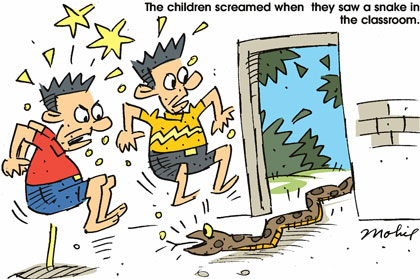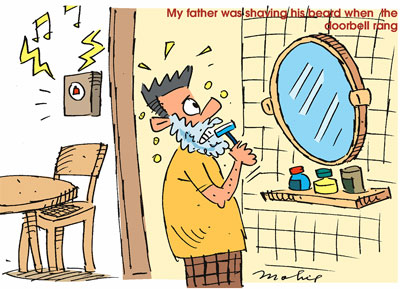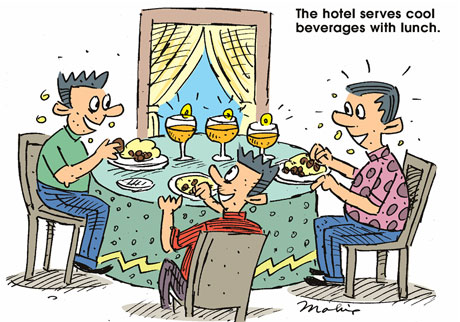|

by R. S. Karunaratne
Adverbial clauses with ‘when’ and ‘while’
[When ]
We use an adverbial clause beginning with ‘when’ for a short action
that takes place just before another short action in the main clause.
Anuradha giggled when Sam cracked a joke.

Kanchana smiled when she saw her friend.
The speaker forgot the topic when he stood up to deliver his speech.
The children screamed when they saw a snake in the classroom.
Dimuthu got up when he saw the principal.
We also use an adverbial clause beginning with ‘when’ for a short
action that interrupts a long action in the main clause.
We were sleeping when a robber broke into our house.
Sunila was cooking when her baby fell from the cot.
The children were dancing when a stranger knocked on the door.
I was waiting in the queue when the nurse called me.
My father was shaving his beard when the doorbell rang.
[While ]
We use an adverbial clause beginning with ‘while’ for an action which
takes place at the same time as another action takes place in the main
clause.
We usually use the same tense for the main clause and the adverbial
clause if both actions start and end at the same time.
Very often we use the past continuous tense or the past progressive
tense in the main clause and the adverbial clause.
The women were chatting while their children were playing.
I was reading a novel while my sister was watching television.
The children were singing while their father was driving the car.
Some men were fishing while we were having our meals.
I was swimming while my friends were playing cricket.
We can also use the past tense for the main clause and the adverbial
clause.
The women chatted while their children played.
I read a novel while my sister watched television.
The children sang while their father drove the car.

Some men fished while we had our meals.
I swam while my friends played cricket.
[Activity ]
Underline the correct words in the brackets. Check your answers with
the key.
1. Some children played ( while / when ) we read newspapers.
2. Mother stopped sewing ( when / while ) she saw her child.
3. The girls were dancing ( while / when ) I was playing the guitar.
4. John was washing the car ( when / while ) the postman rang the bell.
5. Phelomena read a novel ( when / while ) her baby slept.
6. The students were listening to the teacher ( while / when ) the
principal walked into the classroom.
7. Vimukthi was writing an essay (when / while ) the others were
singing.
8. The train sped fast ( while / when ) the passengers slept.
9. Anura was playing the drum ( when / while ) Vikum was singing.
10. The elephant was bathing in the river ( when / while ) a crocodile
approached it.
Key:
1. while
2. when
3. while
4. when
5. while
6. when
7. while
8. while
9. while
10. when
How to build word families
For a start, let’s make adjectives from nouns.
Write the relevant adjectives against the following nouns.
Check your answers with the key.
[Nouns ] [Adjectives ]
1. effect ....................
2. effort ....................
3. election ....................
4. electricity ....................
5. emotion ....................
6. emphasis ....................
7. end ....................
8. energy ....................
9. entertainment ....................
10. environment ....................
11. event ....................
12. excellence ....................
13. excitement ....................
14. excuse .....................
15. expense .....................
16. experience .....................
17. experiment .....................
18. explanation .....................
19. expression .....................
20. fact .....................
21. faith .....................
22. familiarity .....................
23. fashion .....................
24. fault .....................
25. fear .....................
26. feel .....................
27. fiction .....................
28. fish .....................
29. flower .....................
30. force .....................
31. forest .....................
32. form .....................
33. freedom .....................
34. friend .....................
35. fruit .....................
36. fund .....................
37. furniture .....................
38. glass .....................
39. government .....................
40. ground .....................
Key:
1. effective
2. effortless
3. electoral
4. electric
5. emotive
6. emphatic
7. endless
8. energetic
9. entertaining
10. environmental
11. eventful
12. excellent
13. excited
14. excusable
15. expensive
16. experienced
17. experimental
18. explanatory
19. expressive
20. factual
21. faithful
22. familiar
23. fashionable
24. faultless
25. fearful
26. unfeeling
27. fictional
28. fishy
29. flowery
30. forceful
31. forested
32. reformed
33. free
34. friendly
35. fruitful
36. funded
37. furnished
38. glassy
39. governmental
40. groundless
Starters:
‘A lot’, ‘much’ and ‘many’
‘A lot’ means ‘very much or very often.’ The man the gangsters
assaulted looks a lot like your brother.
A: How are you?
B: I feel a lot better today.
Martha looks a lot older than her husband.
Children used to visit the Zoological Gardens a lot.
There are a lot of people in the park.
Do you do a lot of travelling in your job?
My neighbour earns a lot of money.
I have a lot of books in my library.
‘A lot of’’ is more usual in positive sentences.
I drink a lot of water.
She has lot of friends.
We need a lot of money these days.
Sriyani has a lot of clothes.
Sometimes, we can use ‘a lot’ without a noun.
George ate a lot.
Mary travels a lot.
Ganehsa earns a lot.
Eva dances a lot.
Some women talk a lot.
‘A lot of’ + singular verbThere is a lot of money in the safe.
There is a lot of tea in the jug.
There is a lot of cake in the box.
‘A lot of’ + plural verb
There are a lot of people without jobs.
There are a lot of trees in the park.
There are a lot of shops in Colombo.
A lot of people speak English.
[Much]
As a determiner ‘much’ means a large amount or to a large degree.
I don’t earn much money.
She didn’t talk much.
I like you very much.
I don’t think there is much to be gained by prolonging the strike.
Some children never eat much.
There is not much business on Sundays.
How much water should we drink?
How much is that pair of shoes?
Have you heard much of Leonard?
I’d very much like to visit you.
The two universities are much the same.
She is not much good at writing.
Death penalty is a much discussed issue.
Father is very much concerned about your health.
I can’t do the work of three people - it’s too much.
[Many]
We use ‘many’ mainly in negative sentences and questions to mean ‘a
large number of.’
She doesn’t have many books at home.
Not many students have heard of the new teacher.
There aren’t many public holidays this month.
How many students are there in your class?
Many people voted against the XYZ Party.
The actor was surrounded by many of his fans.
How many time have we met here?
[Activity]
Fill in the blanks with ‘a lot’, ‘a lot of’ ‘much’ or ‘many.’ Check
your answers with the key.
1.Do you drink ................. water?
2. My father has collected .................. books.
3. There isn’t ................ ice-cream in the refrigerator.
4. You need ................ money to buy a brand new car.
5. Hurry up! We haven’t got ............... time.
6. How ............... foreign languages have you learnt?
7. The police officer didn’t ask me .................. questions.
8. There were ................... foreigners but I didn’t talk to
anyone.
9. Gwen knows ............... about art.
10. If you travel by train, it won’t cost .............
Key:
1. much 2. a lot of 3. much 4. a lot of 5. much 6. many 7. a lot of
8. a lot of 9. a lot 10. much
Current English usage
The aim of this column is a practical one: to provide an easy work of
reference for those who wish to write and speak good English.
To some extent, it is prescriptive. It deals with points of syntax,
punctuation, style, idiom, spelling and modern usage generally.

1. Some speakers use ‘be’ for an imaginary or assumed condition: If
the question be asked whether we should revive the capital punishment...
Although not incorrect, it is rather old-fashioned.
Say: If the question is asked whether we should revive the capital
punishment...
2. Once a mother wrote to a class teacher:
“The reason my son was absent from school was because he was ill”.
Avoid “the reason is because” and say: My son was absent from school
because he was ill.
3. Sometimes we wonder whether to use ‘begin’ or ‘commence.’ Wherever
possible, use ‘begin’.
‘Commence’ is a formal word used for the announcement of meetings and
concerts.
4. Once a student wrote: “At the end of the lecture the chairman
moved a vote of thanks on behalf of the speaker.”
The sentence is wrong because “on behalf of” means “acting for”
somebody. Clearly the principal was not acting for the speaker.
Say: At the end of the lecture the chairman moved a vote of thanks on
behalf of the audience.
5. The following sentence was found in a school essay.
“Being as we were students we were not allowed admission to the cinema.”
Say: Being students we were not allowed admission to the cinema or As we
were students, we were not allowed to admission to the cinema.
6. Beside or besides?
Use ‘besides’ only when the meaning is ‘in addition.’ In all other
contexts, use ‘beside.’
Come and sit beside me.
Do you play any other musical instruments besides the violin?
7. Between you and me / Between you and I
’Between’ is a preposition and any pronoun that follows it must be in
the accusative case.
Say: Between you and me, not between you and I.
8. Between / among
The rule that ‘between’ is used of only two things or people and ‘among’
of more than two is no longer valid.
“The three children saved over Rs 1,500 between them” is quite
acceptable English.
“I saw a few familiar faces among the crowd” is correct.
9. Beverage / Drink
’Beverage’ is a piece of official jargon.
The hotel serves cool beverages with lunch. Say: The hotel serves cool
drinks with lunch.
10. Beware of
Although William Shakespeare wrote, “Beware the Ides of March,” in
modern English we have to say ‘beware of’. Beware of the dog.
11. Biannua / Biennial
Biannual means twice a year. Biennial means once every two years.
12. Bona fide / Bona fides
’Bona fide’ means ‘in good faith.’ ‘Bona fides means ‘good faith.’ He is
a bona fide applicant. They questioned my bona fides. |


